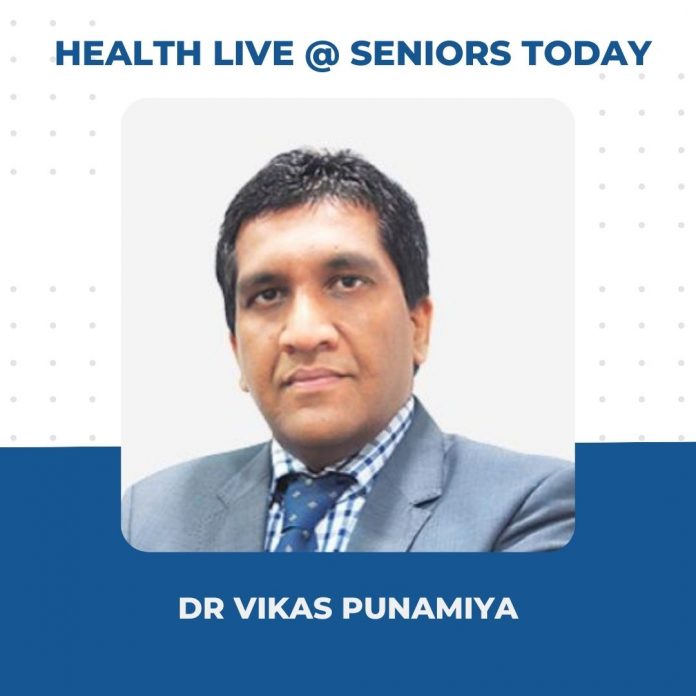On January 29, 2022, Seniors Today hosted another interesting weekly Health Live webinar. This week we had with us Dr Vikas Punamiya who spoke on Sleep Apnoea and other Sleep Disorders in Senior Citizens.
A little about Dr Vikas, Dr Vikas Punamiya is a senior medical professional with over two decades of experience. He is currently attached to Breach Candy, S L Raheja, Global and Masina Hospitals as a Consultant Pulmonary & Sleep Physician.
Dr Punamiya is internationally trained and has been associated with leading international medical institutions such as the Birmingham Heartlands Hospital, UK, the Lancaster Hospital, UK, the Hornsby Ku – Ring Gai Hospital, Australia, and more. He has a special interest in the speciality of Sleep Medicine and has completed his Fellowship in Sleep Medicine from Birmingham Heartlands Hospital, UK
Dr Punamiya has attended conferences and workshops around the world and has been invited as a guest speaker by reputed medical institutions of India. He has also worked on a host of research papers that have been published in peer – reviewed medical journals.
Dr Punamiya is also a reputed member of various national and international associations such as the American Academy of Sleep Medicine, World Sleep Society, American Thoracic Society, European Respiratory Society, Indian Association of Bronchology, amongst others.
Quality of sleep is essential for good health and overall quality of life. Sleep allows our body and mind to recharge and leaves you refreshed and alert when you wake up.
Chronic sleep deprivation has become a bane of our modern society and has become a big public health problem.
Without enough sleep the brain cannot function properly. This can impair your abilities to concentrate, think clearly as well as process memories.
It is also a risk factor for cognitive decline.
Sleep deprivation and sleep apnoea have been documented to be risk factors for early dementia.
Sleep deprivation is a major cause for hypertension, irregular heart rhythms, stroke as well as high cholesterol. It also affects you with diabetes and obesity.
Sleep apnoea is known to be a risk factor for diabetes mellitus type 2 and is known to impair your diabetic control.
Recent research has also found that sleep deprivation can also affect your sex life. It leads to a decreased sex drive, low fertility and even erectile dysfunction.
50% of men who have sleep apnoea also suffer from erectile dysfunction.
Snoring also affects your marriage. Loud snoring can not just keep you from getting proper rest but also disturbs your partner.
Exhaustion due to consistent sleep deprivation can cause road traffic accidents and other dangerous accidents at work.
As a teen you need 8-10 hours of sleep. As an adult you require at least 7-8 hours of sleep.
Most people sleep at times that make most sense to their professional, family and personal commitments. Their awakening times are mostly dependent on their responsibilities. And commitments. Whereas when they go to sleep depends on their personal preference and timings.
Napping is not a replacement for sleep. But it does make you feel rested during the day. It can be helpful for people who cannot stick to a similar schedule for sleep everyday.
Even a short power nap can keep you refreshed for the rest of the day.
Keep your naps short.
Avoid napping after 3 PM in the afternoon because that will definitely affect your night sleep
The most common sleep disorders include
- Obstructive sleep apnoea
- Insomnia
- Restless leg syndrome
Common cause of sleep disorders
- Physical- chronic pains
- Medical- individuals with asthma
- Psychological- depression, anxiety disorders
- Social- alcohol consumption. Alcohol may induce sleep but it hampers the quality of sleep. It also worsens sleep apnoea; erratic work schedules.
- Medications can interfere with our sleep
- Ageing
How to identify if you have a sleep disorder?
- If you have trouble sleeping or regularising your sleep.
- If you wake up tired or unrefreshed.
- If you have a problem with snoring.
- Falling asleep at the wheel, while driving or while you’re waiting at the signal
- Struggling to stay awake while you’re not actively participating in the activity such as watching a movie
- Waking up frequently at night
- Having difficulty with your memory or being more forgetful
- Being increasingly irritable
- Feeling the need to take multiple short naps during the day
Common causes of insomnia:
- Stress
- Poor sleeping habits and hygiene
- Being afraid of going to bed (because you’re afraid if you’ll be able to get some sleep)
Things that you can do to sleep better:
- At least 6 hours before going to bed, cut your caffeine intake. Alcohol should be stopped at least 3 hours prior.
- Make sure you don’t have a heavy evening meal. Make sure you have your last meal 3 hours before going to bed.
- Avoid heavy and rigorous exercising after the evening hours or 7 o’clock in the evening.
- Stop working/ studying/ stressing 1 hour before going to bed. Create a calm and stress free environment before going to bed.
- Turn off your electronics.








